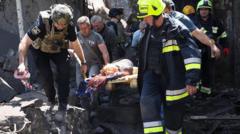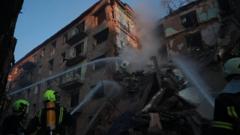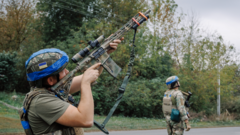As NATO leaders convene, Germany pledges to increase defense spending amid ongoing threats, while discussions on financial commitments intensify.
Germany Commits to Strengthening European Defense at NATO Summit in The Hague

Germany Commits to Strengthening European Defense at NATO Summit in The Hague
Chancellor Friedrich Merz emphasizes collective security in the face of Russian aggression during NATO's gathering of leaders.
Germany's Chancellor Friedrich Merz asserted the nation's commitment to bolstering Europe’s defense during a pivotal NATO summit held on Tuesday in The Hague. With the summit the first for US President Donald Trump since 2019, Merz addressed Germany's parliament, reaffirming that Russian President Vladimir Putin's intentions towards Ukraine demonstrate the need for a robust response to aggression.
The summit, aimed at creating a lasting peace in Europe, will see all 32 NATO leaders commit to a defense spending increase to 3.5% of their nations' GDP, alongside an additional 1.5% for related infrastructure projects. In light of recent deadly attacks in Ukraine, where casualties mounted from Russian missile strikes, Merz underscored that Germany would play its part in ensuring a secure Euro-Atlantic region.
NATO Secretary General Mark Rutte, echoed by European leaders, is encouraging member states to invest in their military capabilities while reassuring them of unwavering US support. As NATO explores pathways to meet increased spending goals, a new investment plan is on the table, promoting a formal commitment to a target of 5% of GDP for defense.
Despite some nations lagging in their current defense budgets, including Spain, which is notably below 1.3%, there appears to be a united front among member states towards meeting the new spending thresholds. The discussions at the summit are occurring against a backdrop of wider geopolitical tensions, including the ongoing conflict between Israel and Iran, further heightening the urgency for NATO to solidify its defense measures.
Meanwhile, Ukrainian President Volodymyr Zelensky arrived at the summit, set for a critical meeting with Donald Trump, reflecting the heightened diplomatic interactions surrounding NATO’s commitments to Ukraine's security amidst the continuous threat posed by Russia. The collective anticipation surrounding the outcomes of this summit has raised questions about its significance—perhaps on par with key NATO meetings during the Cold War.
As Europe grapples with a changing security landscape, leaders navigate domestic and international pressures while reaffirming a collective stance intended to discourage aggression and promote stability across the region.
The summit, aimed at creating a lasting peace in Europe, will see all 32 NATO leaders commit to a defense spending increase to 3.5% of their nations' GDP, alongside an additional 1.5% for related infrastructure projects. In light of recent deadly attacks in Ukraine, where casualties mounted from Russian missile strikes, Merz underscored that Germany would play its part in ensuring a secure Euro-Atlantic region.
NATO Secretary General Mark Rutte, echoed by European leaders, is encouraging member states to invest in their military capabilities while reassuring them of unwavering US support. As NATO explores pathways to meet increased spending goals, a new investment plan is on the table, promoting a formal commitment to a target of 5% of GDP for defense.
Despite some nations lagging in their current defense budgets, including Spain, which is notably below 1.3%, there appears to be a united front among member states towards meeting the new spending thresholds. The discussions at the summit are occurring against a backdrop of wider geopolitical tensions, including the ongoing conflict between Israel and Iran, further heightening the urgency for NATO to solidify its defense measures.
Meanwhile, Ukrainian President Volodymyr Zelensky arrived at the summit, set for a critical meeting with Donald Trump, reflecting the heightened diplomatic interactions surrounding NATO’s commitments to Ukraine's security amidst the continuous threat posed by Russia. The collective anticipation surrounding the outcomes of this summit has raised questions about its significance—perhaps on par with key NATO meetings during the Cold War.
As Europe grapples with a changing security landscape, leaders navigate domestic and international pressures while reaffirming a collective stance intended to discourage aggression and promote stability across the region.





















